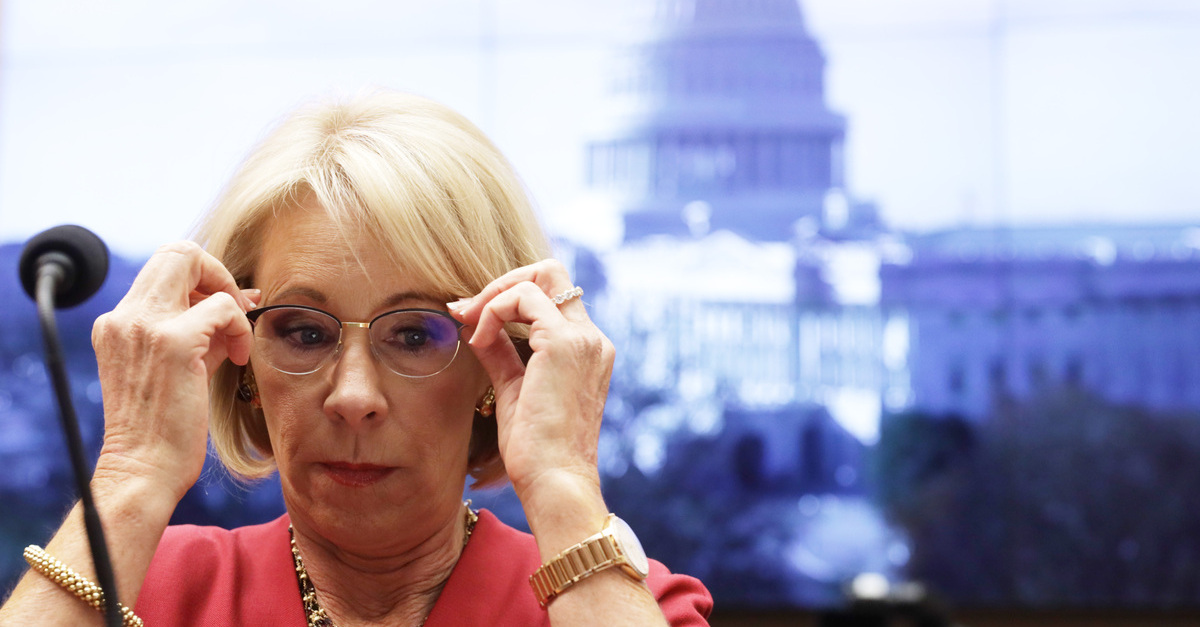
A federal judge on Wednesday ruled that former Secretary of Education Betsy DeVos must testify in a class-action lawsuit concerning how her department handled student loan forgiveness claims from borrowers who alleged they were defrauded by for-profit scam colleges.
In a 12-page order, William Alsup, an appointee of Bill Clinton who sits in the U.S. District Court for the Northern District of California, denied a motion to quash a subpoena for DeVos’s testimony, citing to the “extraordinary circumstances” surrounding her decision to halt issuing final decisions on student-loan borrower-defense applications within the required time period.
The motion was filed by jointly by DeVos and the Biden administration and contended that the demand to depose the former secretary was “a transparent attempt at harassment—part of a PR campaign that has been central to [the students’] litigation strategy from the outset. It should be rejected and the court should quash the subpoena.”
The case stems from the DoE’s changes to the Borrower Defense to Repayment Program since DeVos took over the department, including the implementation of rules that made it more difficult for borrowers to file claims against schools by significantly increasing the amount of proof required to show potential fraud. Under DeVos’s leadership, the department stopped processing new applications for nearly 18 months, from June 2018 until December 2019, then promptly dismissed most claims with little explanation being provided to the filers.
Plaintiffs Theresa Sweet, Chenelle Archibald, Daniel Deegan, Samuel Hood, Tresa Apodaca, Alicia Davis, and Jessica Jacobson filed a class-action lawsuit in June 2019 on behalf of approximately 160,000 borrowers. The complaint alleged that the processing delays and unexplained dismissals constituted unlawful stonewalling and sought to compel Secretary DeVos to begin deciding applications again.
The court approved a preliminarily proposal for DeVos to decide claims and effect relief last May, but Judge Alsup pulled the deal in October, stating that “the Secretary had been issuing alarmingly-curt denial notices for several months, in violation (as class counsel put it) of both the spirit of the proposed settlement and the Administrative Procedure Act. “
In that ruling, Alsup harshly rebuked DeVos, noting that after she took over the department it went from granting 99.2-percent of applications to rejecting 89.9-percent of applications.
“Simply put, where there’s smoke, there’s fire. After justifying eighteen months of delay largely on the backbreaking effort required to review individual applications, distill common evidence, and ‘reach considered results,’ the Secretary has charged out of the gate, issuing perfunctory denial notices utterly devoid of meaningful explanation at a blistering pace,” he wrote in the order.
In Wednesday’s order Alsup said the lack of explanation surrounding DeVos’s decisions and “material gaps” in information gleaned in the case thus far warranted her sitting for a three-hour deposition with the borrowers’ attorneys.
“Beyond illuminating her involvement, these material gaps at the highest rungs of the Department’s decision-making record reveal the necessity of Secretary DeVos’s testimony for an independent reason. We lack an official and contemporaneous justification for the eighteen month delay because this suit concerns agency inaction, and not the usual agency action,” Alsup wrote.
“In sum, extraordinary circumstances warrant the deposition of Secretary DeVos for three hours, excluding breaks. No part of this order maligns the Secretary’s deliberative-process privilege. But class counsel are entitled to probe matters broadly related to the actual cause for the challenged eighteen-month delay, the development, approval, and use of the form-denial letters, and the Secretary’s involvement in clearing the backlog of our class members’ borrower-defense claims.”
Read the full order below.
[image via Alex Wong/Getty Images]